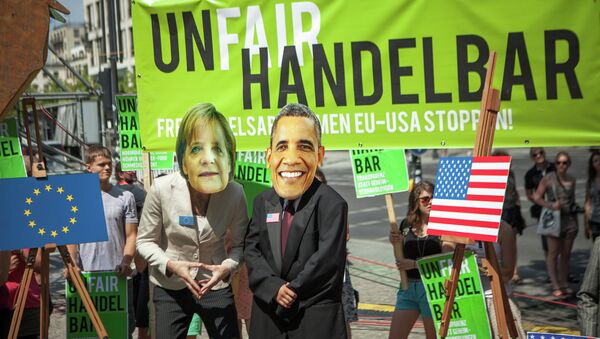The Ombudsman says Brussels is fast becoming the "second most important lobbying hub in the world, after Washington DC."
O'Reilly said she was concerned with "revolving doors" cases and the composition of expert groups in the European Commission as well as the lack of lobbying transparency in the TTIP negotiations.
.@JunckerEU receives @EUombudsman Emily O'Reilly pic.twitter.com/DJ1NvBVaIK
— Natasha Bertaud (@NatashaBertaud) May 6, 2015
In a report to the meeting in Brussels, she said: "There is still room for improvement, not only in the Commission but also in other EU institutions".
"The Ombudsman would like to facilitate a debate about what has been achieved and what further measures could be taken to improve lobbying transparency in Brussels."
The controversial TTIP agreement has been heavily promoted by US President Barack Obama, but has drawn criticism from the United Nations Independent Expert on the promotion of a democratic and equitable international order, Alfred de Zayas, who expressed deep concerns over the talks between the US and the EU.
@EU_TTIP_team @USEmbTallinn why did it take a court order for MEPs to gain access to several materials re TTIP? no transparency = no deal.
— kampus (@lisettekampus) May 11, 2015
He said: "I am concerned about the secrecy surrounding negotiations for trade treaties, which have excluded key stakeholder groups from the process, including labor unions, environmental protection groups, food-safety movements and health professionals.
"Proactive disclosure by governments, genuine consultation and public participation in decision-making are indispensable to make these agreements democratically legitimate. 'Fast-tracking' adoption of such treaties has a detrimental impact on the promotion of a democratic and equitable world order."
European Commission Refuses to Give Details of Talks
The Ombudsman opened an investigation into the TTIP talks in July 2014 and also conducted a public consultation. In January 2015, she submitted a list of recommendations to the Commission, including a call for increased transparency around meetings that Commission officials hold on TTIP with business organisations, lobby groups or NGOs.
How will the world respond to #TTIP? http://t.co/fxbHJx6PUk #globaltrade pic.twitter.com/Ii3fo1azGY
— World Economic Forum (@wef) May 11, 2015
In its reply, the Commission states that, for reasons of 'proportionality', it does not currently intend to publish agendas or minutes of such meetings or to extend the transparency obligations to levels of Director, Head of Unit and negotiator. It also argues that data protection reasons stand in the way of it publishing the names of meeting participants without their consent.
O'Reilly responded:
"In the Ombudsman's view, data protection should not be used as an automatic obstacle to public scrutiny of lobbying activities in the context of TTIP. It is possible to deal with data protection concerns by informing participants when they are invited to meetings of the intention to disclose their names. This should be done in the public interest."


